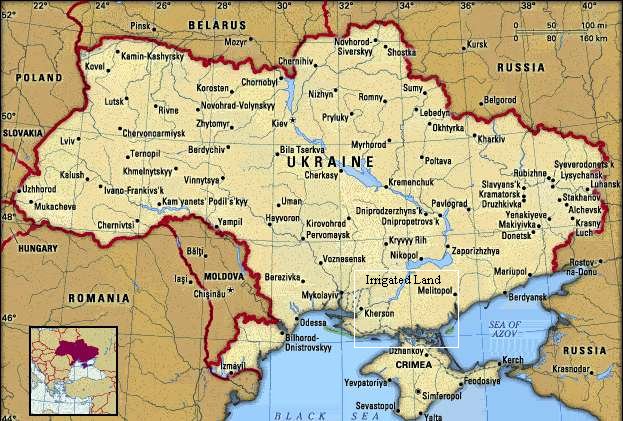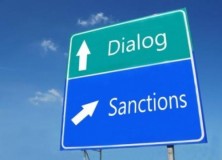 Ukraine is in a crisis. The U.S., Russia, and the EU are all trying to gain increased influence in the region. That’s apparent.
Ukraine is in a crisis. The U.S., Russia, and the EU are all trying to gain increased influence in the region. That’s apparent.
Fox News and others are quickly jumping on anything they can that makes Russia appear as a threat to our National security, as if Ukraine, once firmly under the umbrella of the former USSR, would be anything more than a satellite state of Russia, as it was in the past.
With an inaccurate story that claimed Russian leader Putin invaded Ukraine now debunked, the War Hawk Tea Party fanatics and Obama haters, who think military action should be taken at every opportunity to show the world our “strength,” seem to weening themselves off the hallucinogenic Kool-aid they so often drink. Their Kool-aid would have had us involved in Syria, if the American public hadn’t made it overwhelmingly clear they weren’t thirsty for stupidity.
Now talk has moved to imposing economic sanctions on Russia. Unlike imposing sanctions on countries like Cuba and Iran, in which sanctions only hurt the citizens of those countries and not the rulers, little would be accomplished by imposing sanctions on Russia.
Any pain we could inflict on Russia would be felt economically by us, as well. Like it or not, the global economy of the major powers is tied together. What affects one, affects all.
According to the US Chamber of Commerce data, the US and Russia Net Trade last year was $38.1 billion. The US exported $11.26 billion to Russia and imported $26.96 billion in goods. Russia also exports over $19 billion of oil and petroleum products to the US.
Trade between the EU and Russia is important to both, as member states account for about 50 percent of total Russian imports and exports. In 2012, trade between the two neighbors reached, Euro 123 billion ($168 billion USD).
One of Russia’s most valuable exports to Europe is something factories and households run on every day: natural gas. Europe imports one-third of its natural gas from Russia, with Germany being the biggest client importing nearly 30 billion euro annually. In 2012, 75 percent of all European imports from Russia were energy.
Many countries in Europe have strategic partnerships with Russia’s state-owned gas giants, Rosneft and Gazprom.
According to Eurostat data, Russia accounts for 7 percent of total imports and 12 percent of total exports in the 28 European Union bloc, making it the regions third most important trading partner, behind the USA and China.
2 US companies with big Russia presence
Several of America’ biggest companies- Boeing, Cargill, Ford, General Motors, ExxonMobil, to name a few- all have a huge presence in the Russian market.
Boeing’s investment in Russia is deep, as the aerospace carrier sources a considerable amount of steel, titanium, and aircraft parts from Russian companies. Boeing receives about 35 percent of its titanium from state-owned, Rostec. In 2013, Boeing’s deliveries to Russian carriers were valued at $2.1 billion, and the company plans to spend $27 billion in Russia, Bloomberg reports.
“We are watching developments closely to determine what impact, if any, there may be to our ongoing business and partnerships in the region,” Doug Alder, a spokesman for Chicago-based Boeing, told Bloomberg.
Last year, Russia was a $11.2 billion market for the US, with heavy trade in automobiles and aircraft, according to Commerce Department data.
US automakers have a high exposure to Russian markets, so are closely watching US economic actions against Russia. Ford has sold over 1 million automobiles in Russia, and in 2013, sold 105,000 cars. GM, which has a 9 percent market share, sold 258,000. Both companies have shifted production plants from Europe to Russia, which is set to become Europe’s biggest car market by 2016.
ExxonMobil has partnered with Rosneft in exploring the Bazhenov oil field in Western Siberia, a deal that could be worth up to $500 billion. ExxonMobil is planning to build a $15 billion LNG terminal project in the Bazhenov field, and also has joint venture projects set up to explore Black Sea reserves.
Senator Chris Murphy, chairman of the Senate’s subcommittee on Europe, said the sanctions could be extended to Russia’s banks. Russia’s two largest state banks are Sberbank, Europe’s third largest, and VTB.
Both banks have a strong industry presence in London, which has indicated it isn’t moving towards the sanctions. A leaked document from Downing Street shows that the UK government doesn’t plan to follow America-led asset freezes or trade restrictions, but are mulling over visa restrictions and travel bans on key Russian politicians.
Indications are that Putin is not so much concerned with all of Ukraine, as he is with Crimea.
Russia gave Crimea to Ukraine in 1954, when both nations were part of the Soviet Union. Ukraine naturally took Crimea with it in 1991, when it declared its independence following the breakup of the former Soviet Union. Yet, the 10,000-square-mile peninsula, with access to the all-important Black Sea, has existed as a semi-autonomous republic, with a 60 percent majority of ethnic Russians.
Crimea, the Black Sea peninsula currently holding the world’s attention, has been fought over by Cimmerians, Bulgars, Greeks, Goths, Huns,Turks and Mongols.
Russia has sought to portray the uprising against Yanukovych as a coup led by Western-backed extremists and thugs. Kiev’s new leaders rolled the dice on the West, seeking closer integration with Europe.
With Ukraine torn between a desire to be part of the west, and its past as part of the Russian empire, and with the Kiev-based revolution forcing the issue, Crimea was the logical flashpoint. As the revolution unfolded, ethnic Russians attacked minority Ukrainians in Crimea’s capital, Simferopol, even as Ukrainians persecuted ethnic Russians in the northern cities, including Kiev.
The Black Sea Fleet had been disputed between Russia and Ukraine since the collapse of the Soviet Union back in 1991.
It’s only relatively recently that Russia and Ukraine have once again been at odds over its control and use after coming to an agreement years ago.
In 1997, the sides finally managed to find common ground and signed three agreements determining the fate of the military bases and vessels in Crimea.
Russia has received 81.7 per cent of the fleet’s ships after paying the Ukrainian government a compensation of US$526.5 million.
Moscow also annually writes off $97.75 million of Kiev’s debt for the right to use Ukrainian waters and radio frequency resources, and for the environmental impact caused by the Black Sea Fleet’s operations.
According to the initial agreement, the Russian Black Sea Fleet was to stay in Crimea until 2017, but the deal was later prolonged for another 25 years.
Russia has kept its Naval Black Sea fleet there and the population has long felt more allegiance to Moscow than to Kiev. So when last month’s Ukrainian Revolution, which resulted in the ouster of ethnic Russian President Viktor Yanukovych, also established Ukrainian the sole language of the land, the longstanding tensions between Crimea’s two dominant ethnic groups were rubbed raw.
When the dust settles Crimea will be firmly under the influence of Russia. Ukraine, seeking it’s own bailout due to a failed economy, will have its hand out to the EU seeking money. The first billion dollars will be given to them from the U.S. taxpayers.
Russia gets the sweet spot of Crimea, the US claims it protected the sovereignty of the independent nation, Ukraine, and the EU gets to impose austerity measures on another broke-ass country.
Meanwhile, as our attention is focused on Ukraine, behind the curtain where the real story lies is the U.S. and China making moves to control the natural resources of African nations.
Disclaimer: On January 4, 2016, the owner of WestEastonPA.com began serving on the West Easton Council following an election. Postings and all content found on this website are the opinions of Matthew A. Dees and may not necessarily represent the opinion of the governing body for The Borough of West Easton.







